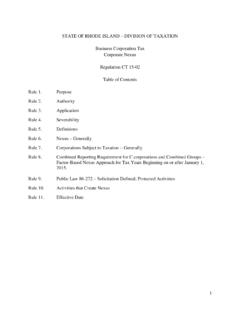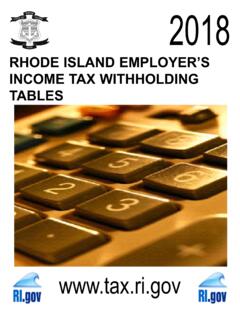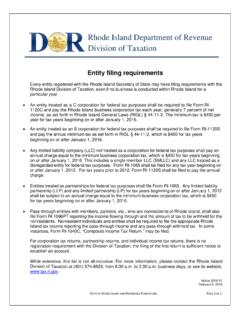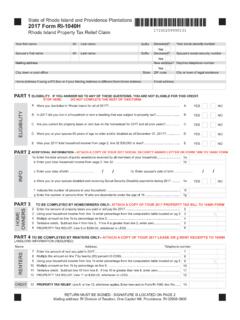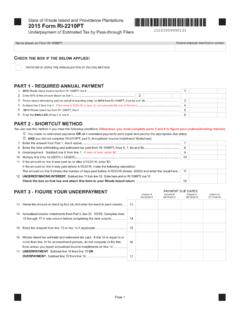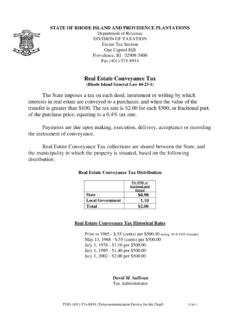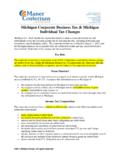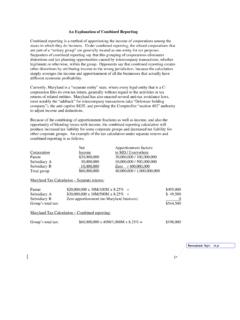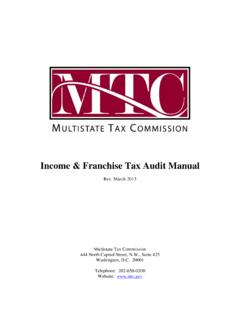Transcription of STATE OF RHODE ISLAND DIVISION OF TAXATION …
1 1 STATE OF RHODE ISLAND DIVISION OF TAXATION business corporation TAX apportionment OF NET income REGULATION CT 15-04 TABLE OF CONTENTS Rule 1. Purpose Rule 2. Authority Rule 3. Application Rule 4. Severability Rule 5. Definitions Rule 6. apportionment Generally Rule 7. Combined Reporting Requirement for Tax Years Beginning on or After January 1, 2015 Rule 8. Single Sales Factor apportionment and Market Based Sourcing Rule 9. Three-Factor apportionment Using Sales, Property and Payroll Rule 10. Special apportionment Formulas Pre-2015 Rule 11. Special apportionment Formulas 2015 and Thereafter Rule 12.
2 Variation of Method of Apportioning income Rule 13. Record Keeping Rule 14. Effective Date Rule 15. Appendix Additional Examples 2 Rule 1. Purpose These rules and regulations implement RIGL 44-11-13 through 44-11-15. These sections allow for apportionment of net income for businesses within and partially within the STATE . Rule 2. Authority These rules and regulations are promulgated pursuant to RIGL 44-11-13 through 44-11-15, and RIGL 44-1-4, which authorizes the RHODE ISLAND tax administrator to make rules and regulations, as the administrator may deem necessary for the proper administration and enforcement of the tax laws of this STATE .
3 The rules and regulations have been prepared in accordance with the requirements in RIGL 42-35-1 et seq. of the RHODE ISLAND Administrative Procedures Act. Rule 3. Application These rules and regulations shall be liberally construed so as to permit the DIVISION of TAXATION the authority to effectuate the purpose of RIGL 44-11-13 through 44-11-15 and other applicable STATE laws and regulations. This Regulation explains apportionment for corporations, pass-through entities, sole proprietorships, and other business types as required. All examples in this Regulation are provided solely for the purpose of illustrating basic concepts that are set forth in the Rules herein, and may not introduce all relevant considerations.
4 Such examples shall not serve as precedents in administrative hearings or other legal proceedings, and are not intended to cover all possible situations. Rule 4. Severability If any provision of these rules and regulations, or the application thereof to any person or circumstance, is held invalid by a court of competent jurisdiction, the validity of the remainder of the rules and regulations shall not be affected thereby. Rule 5. Definitions apportionment means the formula used to determine the amount of income that is attributable to RHODE ISLAND by a combined group or any other taxpayer. Arithmetical mean means the sum of the factors available to the taxpayer divided by the number of fractions used.
5 Billing address means the location indicated in the books and records of the taxpayer as the primary mailing address relating to a customer s account as of the time of the transaction as kept in good faith in the normal course of business and not for tax avoidance purposes. 3 Broadcast customer means a person who has a direct contractual relationship with a broadcaster from whom the broadcaster derives gross receipts. The term broadcast customer includes but is not limited to an advertiser or licensee. Broadcaster means a taxpayer that is engaged in the business of broadcasting, and includes a television network, a cable program network, and a television distribution company.
6 The term broadcaster does not include a Platform Distribution Company such as a cable system operator or a direct broadcast satellite system operator. Broadcasting means the transmission of film programming by an electronic or other signal conducted by microwaves, wires, lines, coaxial cables, wave guides, fiber optics, satellite transmissions, or through any other means of communication directly or indirectly to viewers and listeners. business customer means a customer that is a business operating in any form, including an individual that operates a business through the form of a sole proprietorship. Sales to a non-profit organization, to a trust, to the United States Government, to any foreign, STATE , or local government, or to any agency or instrumentality of such government shall be treated as sales to a business customer and shall be assigned consistent with the rules that apply to receipts from such sales.
7 C corporation means a corporation organized under subchapter C of the Internal Revenue Code, as defined in Section 1504 of that subchapter. For the purposes of this Regulation, the term includes those entities treated as C corporations for federal tax purposes, so long as such entities would qualify as a corporation , as defined in this Regulation. Combined group means a group of two or more corporations in which more than fifty percent (50%) of the voting stock of each member corporation is directly or indirectly owned by a common owner or owners, either corporate or non-corporate, or by one or more of the member corporations, and that are engaged in a unitary business .
8 Commercial domicile has the meaning set forth in RIGL Common ownership means more than fifty percent (50%) of the voting control of each member of the group is directly or indirectly owned by a common owner or owners, either corporate or non-corporate, whether or not the owner or owners are members of the combined group. corporation has the meaning set forth in RIGL 44-11-1(4), and for purposes of mandatory unitary combined reporting under the RHODE ISLAND General Laws, includes an LLC, partnership, or other entity electing to be taxed as a corporation for federal tax purposes. Although a partnership or other pass-through entity may not always be considered a corporation includible in the combined group on an entity basis as a member, when a partnership or other pass-through entity is directly or indirectly held by a corporation , the business conducted by such a partnership or pass-through entity is considered the business of the corporation to the extent of the corporation s distributive share of the partnership or pass-through entity net income .
9 4 Cost of performance sourcing means the sourcing method used for gross receipts from transactions other than sales of tangible personal property under the three-factor apportionment formula set forth in Rule 9 of this Regulation. DIVISION of TAXATION means the RHODE ISLAND Department of Revenue, DIVISION of TAXATION . The DIVISION of TAXATION may also be referred to as the DIVISION or the Tax DIVISION . Documentary evidence means journals, books of account, invoices, expense reports, or other records maintained in the regular course of business , or any other records required to be maintained for legal or accounting purposes.
10 Film programming means one (1) or more performances, events, or productions (or segments of performances, events, or productions) intended to be distributed for visual and auditory perception, including but not limited to news, entertainment, sporting events, plays, stories, or other literary, commercial, educational, or artistic works. income -producing activity means, for each separate item of income , the transactions and activity directly engaged by the taxpayer for the ultimate purpose of obtaining profit or gain. For apportionment purposes, such activity does not include transactions and activities performed on behalf of a taxpayer, such as those conducted on the taxpayer s behalf by an independent contractor.
